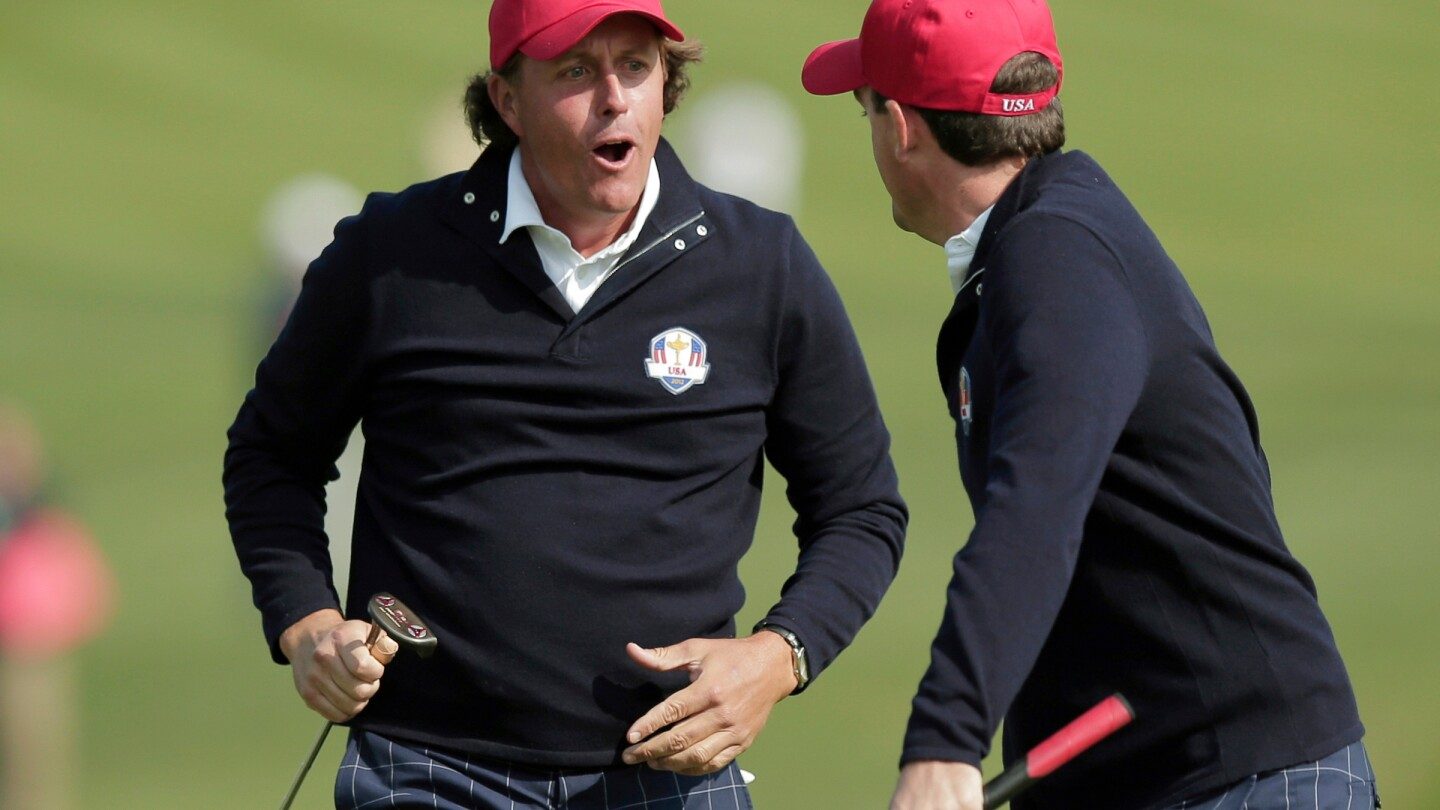FARMINGDALE, NY (AP) — This could have been Phil Mickelson’s big moment. At 55, the six-time major champion, who spearheaded the migration to LIV Golf, has more starts (12) than any other player in the U.S.-European event. His role as team captain at Bethpage Black seemed natural.
Bethpage, the rugged public course near New York, is where the tradition of fans singing “Happy Birthday” to him began in 2002. It’s also where Mickelson returned to golf following his wife’s cancer diagnosis in 2009, and where he suffered two of his six painful U.S. Open finals, the only major he never won. “That’s where I felt like things clicked” with the New York fans, Mickelson said in 2019, ahead of his return for the PGA Championship, which remains his last major appearance there.
Mickelson always had a great love for New York, and New York reciprocated that affection for its adopted left-hander. In the Ryder Cup, a tournament that seeks to extract every ounce of emotion from everyone involved—captains, players, fans—no one could have connected better than he did. Yet, as former captain Paul Azinger said, "He took a detour and ran with it."
A captain in waiting for four years
Still in his early 40s and still ranked among the world's top 10 when Bethpage was announced as the host in 2013, those in golf were already eyeing his future. Until 2021, the possibility of Mickelson captaining at Bethpage remained very real. Four years earlier, when the U.S. met at Whistling Straits for what would become a landslide victory, Mickelson had won the PGA Championship at age 50 just four months earlier. However, his form didn't hold up, and his streak of appearances as a player, which spanned from 1995 to 2018, came to an end.
Still, captain Steve Stricker asked him to be vice-captain, and Mickelson gladly accepted, expressing on Twitter that he was "humbled and honored" by the assignment.
The transition to LIV and the break with traditional golf
Less than six months later, he led a long and complicated break to join the Saudi-funded LIV. Because of this decision, Mickelson was excluded from what could have been his role as a traditional statesman of golf. Outside the azaleas of Augusta National and the Swilcan Bridge at St. Andrews, the Ryder Cup is one of the most traditional events in the sport.
“I don’t think I’m the right person to be involved with the team because I’m a very divisive character right now, and I understand that,” Mickelson said last year on ESPN’s “The Pat McAfee Show,” anticipating a call he knew wouldn’t come. Six months later, the PGA of America elected Keegan Bradley as captain, even though he and Mickelson had been good friends and a successful pairing in two Ryder Cups, where their record was 4-1, albeit with little success due to the U.S. losses.
Mickelson, a man of the people, especially in New York
Early in his career, Mickelson cleverly built a reputation as a player who seemed like one of the crowd. While Tiger Woods dominated the sport with singular intensity, Mickelson represented the underdog, a somewhat pudgy player who sometimes four-putted but compensated with a flop shot adorned with his signature "side sauce" (side spin) that no one would dare to replicate. No one tells underdog stories better than New York, and those feelings intensified after the September 11 attacks.
The fact that his birthday coincided with the week of the US Open made it even more special. In 2002, fans at Bethpage sang "Happy Birthday" to him on the first tee. That year, Mickelson briefly attempted to catch Woods, briefly cutting a four-shot deficit to two. In 2009, the crowd erupted when he tied for the lead with an eagle on the 13th hole, but then missed several short putts and bogeys, setting a record with his fifth US Open finish.
His collapse on the 18th hole at Winged Foot remains his worst loss at a U.S. Open. Another moment at Shinnecock showed him at his worst, hitting a moving ball onto the green in protest of the USGA's setup, which cost him a two-stroke penalty. Golf purists viewed this as an abomination, though Mickelson apologized, saying he meant no disrespect.
The fans moved on. Two years later, at Kiawah, he became the oldest man to win a major at the PGA Championship, being cheered by the crowd as he walked onto the 18th green. However, his move to LIV made his return to traditional golf and his position as captain in the Ryder Cup seem almost impossible.
“As a divisive individual, I don't think I'm the best unifier for the Ryder Cup going forward,” he commented in the interview with McAfee. “And that's okay, because I've had a lot of great memories with it.” Despite being on the outside, his former teammate and current captain values his legacy. When asked who the greatest Ryder Cup players of all time are, Bradley didn't hesitate to include Mickelson alongside Azinger, Payne Stewart, and Raymond Floyd. “I remember watching events as a kid and my dad saying, 'He's a Ryder Cup player,' or 'He's a major champion.' You never forget that.”
“It accompanies you forever.”






